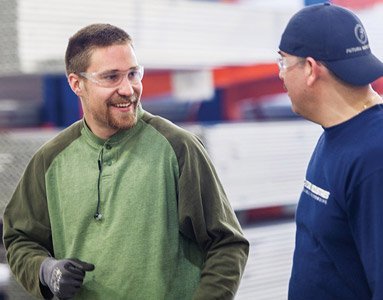Social Security makes every effort to ensure that any information published is accurate and up to date, but some information on this webpage may be historical.
Josh's Success Story: Manufacturing a Promising Future
Published in 2014
 Josh is no stranger to hard work. At the age of four, he was hit by a car and experienced a traumatic brain injury (TBI) that would cause episodic seizures for the rest of his life. The accident also affected his cognition and mobility. Under circumstances that might have discouraged the most determined adult, Josh learned how to walk and eat all over again. He often talked about what life would be like if the accident had never happened – he could go to college, get married, and be a real contributor in his community. Josh said he wanted his life to be "normal."
Josh is no stranger to hard work. At the age of four, he was hit by a car and experienced a traumatic brain injury (TBI) that would cause episodic seizures for the rest of his life. The accident also affected his cognition and mobility. Under circumstances that might have discouraged the most determined adult, Josh learned how to walk and eat all over again. He often talked about what life would be like if the accident had never happened – he could go to college, get married, and be a real contributor in his community. Josh said he wanted his life to be "normal."
With determination and access to specialized support services through helpful programs that included Social Security's Ticket to Work, he achieved far more than he thought possible.
Craving an Active Career
At age 18, Josh began receiving Supplemental Security Income (SSI) and considered where his life would be headed after he finished school. Like most high school students, he knew he wanted to earn a good living doing something he liked after he graduated. He mowed his neighbors' lawns for extra spending money, and did some volunteer work at school to improve his prospects. Josh is an active young man who knew his future job would have to allow him to stay physically fit. But he worried that finding the kind of work he wanted would be challenging.
"It was [going to be] hard for me to find a good job because I can't drive a car, and I sometimes need extra time to learn things," he recalls. "People do not always understand my disability."
Transition with a Ticket to Work
Luckily for Josh, his high school worked closely with employment support providers, and he participated in two programs that set him on a path to meaningful employment: He was part of the Pathways to Careers initiative, a program that connects students with disabilities to internships that match their interests and abilities, and he participated in Social Security's Ticket to Work Program.
Josh learned from his high school transition specialist that he was eligible to receive individualized counseling and assistance that could help him prepare for the workforce, find a job and stay employed. These services, which are free through the Ticket to Work Program, are available to everyone (age 18 through 64) who receives Social Security disability benefits. Through the Ticket Program, Josh would receive skills assessment, career counseling, help with his résumé, interview coaching, assistance navigating a job hunt, and job coaching.
The Ticket to Work Program and the Pathways initiative helped reveal that Josh is a self-starter who is well suited to working with his hands. This was good information to have when it came time to explore internships and long- term employment opportunities. But Josh had to first learn how employment would affect his Social Security disability benefits.
Find Benefits Counseling Help
Benefits counselors (also known as benefits advisors) are professionals who can explain how Social Security Work Incentives apply to you. Professionals who have completed Social Security-sponsored training that qualifies them to offer benefits counseling are known as "Community Work Incentives Coordinators" (CWICs).
Community-based organizations known as "Work Incentives Planning and Assistance Projects" (WIPA), have CWICs on staff. A CWIC can help you learn about Work Incentives and understand how work will affect your benefits. To find a provider that offers benefits counseling, use the "Find Help" tool. Use the filtering feature to pinpoint services tailored to you. Select “Work Incentives Counseling” on the services menu or check the box for "Benefits Counselor on Staff."
For help, you can also call the Ticket to Work Help Line at 1-866-968-7842 or 1-866-833-2967 (TTY).
 Work Incentives
Work Incentives
Like many people considering employment, Josh was concerned about his benefits. He learned from a trained professional (known as a benefits counselor) that rules called "Work Incentives" allow many people to transition into the workforce while continuing to receive healthcare benefits (Medicare and/or Medicaid), and some cash benefits from Social Security. Because each person’s circumstances are different, it's a good idea to consult a benefits counselor who can help you make informed decisions about work.
Once Josh understood what working would mean for his benefits, his high school transition specialist connected him with the help he would need for long-term success in the workforce.
A Continuum of Support
Through the Ticket Program, state Vocational Rehabilitation (VR) agencies and authorized Ticket to Work providers (known as Employment Networks or ENs) offer services that help people prepare for and find work. For example, VR agencies and ENs both may provide career counseling, help with training or education, and assistance with a job hunt. But ENs also provide the continuing "post-employment" support services that set people up for continued success and job retention. Some Ticket to Work Program participants choose to work with an EN from the beginning. Others find a job with help from VR and then work with an EN after VR has closed their case.
Employment Networks and the Services they offer
Like state VR agencies, ENs offer employment services that help you prepare for and find work. Some also provide benefits counseling. Unlike most VR agencies, ENs also offer job retention services that can help you to stay employed. After you have found work, an EN can help you:
- Get Job Accommodations
- Communicate with your Employer
- Stay Organized
- Stay in touch with Social Security
- Report Earnings
To find an Employment Network near you, to use the "Find Help" tool. You can also contact the Ticket to Work Help Line and ask the representative to send a list of ENs in your area.
 When the transition program at Josh's high school introduced him to Pioneer Adult Rehabilitation Center (PARC), a local EN that could help him participate in the Ticket to Work Program, he jumped at the opportunity. The staff at PARC helped Josh identify internship opportunities in the manufacturing industry, and he began an internship with Futura Industries. Futura is an aluminum manufacturing facility, where Josh was paired with a partner to move packages and dye aluminum strips. He benefits from working at a brisk, routine pace in a structured environment where he receives one-on-one training as needed. Futura offers job accommodations that include allowing Josh to have extra time to process information, clear and simple communication from familiar supervisors, and a predictable daily work schedule.
When the transition program at Josh's high school introduced him to Pioneer Adult Rehabilitation Center (PARC), a local EN that could help him participate in the Ticket to Work Program, he jumped at the opportunity. The staff at PARC helped Josh identify internship opportunities in the manufacturing industry, and he began an internship with Futura Industries. Futura is an aluminum manufacturing facility, where Josh was paired with a partner to move packages and dye aluminum strips. He benefits from working at a brisk, routine pace in a structured environment where he receives one-on-one training as needed. Futura offers job accommodations that include allowing Josh to have extra time to process information, clear and simple communication from familiar supervisors, and a predictable daily work schedule.
Promise
The internship at the aluminum manufacturing company worked out well and in September of 2013, Josh accepted a full-time position with Futura Industries. He walks to work every day, where he is happy to simply be one of the guys. He likes that his job allows him to move around and stay active. It is also a plus that the job requires Josh to work with a partner for added camaraderie. Josh is a valued member of the team at Futura and enjoys the sense of accomplishment he gets from a job well done. He also appreciates Futura's wellness program, where fresh fruit and healthy snacks are provided each day. Josh's supervisor speaks highly of him, pointing out that the decision to hire him was an easy one.
Pride
Josh has seen marked improvements in his life since he decided to participate in the Ticket to Work Program. He is employed in a rewarding position that allows him to help his family, and he is happy to be contributing to his community through employment. He is financially self-sufficient, feels free of the limitations imposed by relying on a fixed income, and enjoys spending time with his girlfriend. Josh is living the "normal" life he imagined for himself, and tells friends that they should consider the Ticket to Work Program so they can "... get a good job too!"
With the right support, Josh found his path to a better future. Find yours.
"Our motivation for hiring Josh full-time from the internship [came from his ability to fill a valuable role]. He is able to do the job, and is as capable as any other employee."
Ticket to Work and Work Incentives helped Josh find his path to a better future. Find yours! To learn more, call the Ticket to Work Help Line at 1-866-968-7842 or 866-833-2967 (TTY).